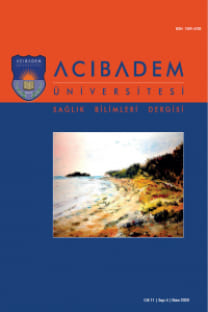Intensive Care Nurses’ Ethical Challenges Caring for People with COVID-19: A Qualitative Study
Bilgisayara karşı tutum, , bilgisayar, , hemşirelik öğrencileri, , problem çözme,
Intensive Care Nurses’ Ethical Challenges Caring for People with COVID-19: A Qualitative Study
Attitude to computers , computers, , health care, , nursing students, , problem solving.,
___
- 1. Amiri E, Ebrahimi H, Asghari Jafarabadi M, et al. Relationship between nurses’ moral sensitivity and the quality of care. Nursing ethics 2019; 26(4): 1265-73. DOI: 10.34172/JCS.2020.015
- 2. Nora D, Rigon C and Zoboli Eş Vieira MM. Moral sensitivity of nurses assessed through scoping review. Cogitare Enferm 2017; 22(2):e47162. DOI: 10.5380/ce.v22i1.47162
- 3. Roshanzadeh M, Borhani F and Mohammadi S. Moral sensitivity and moral distress in critical care Unit Nurses. Medical Ethics Journal, 2017; 10(38):19-28.
- 4. Moon JY and Kim JO. Ethics in the Intensive Care Unit. Tuberc Respir Dis (Seoul). 2015;78(3):175-9. DOI:10.4046/trd.2015.78.3.175
- 5. Larkin ME, Beardslee B, Cagliero E, et al. Ethical challenges experienced by clinical research nurses: a qualitative study. Nurs Ethics 2019; 26(1): 172–84. DOI:10.1177/0969733017693441
- 6. Ejder Apay S, Gürol A and Gür E. Midwifery students’ reactions to ethical dilemmas encountered in outpatient clinics. Nurs Ethics. 2020;27(7): 1542-55. DOI:10.1177/0969733020922875
- 7. Lantos JD. Ethical problems in decision making in the neonatal ICU. New England Journal of Medicine, 2018; 379(19): 1851-60. DOI: 10.1056/NEJMra1801063
- 8. Lusignani M, Giannì ML, Re LG, et al. Moral distress among nurses in medical, surgical and intensive‐care units. Journal of Nursing Management, 2017, 25(6): 477-85. DOI: 10.1111/jonm.12431
- 9. Yönt GH, Korhan E A, Dizer B, et al. Determination of Ethical Problems Experienced by Nurses in the Intensive Care Units. Turkiye Klinikleri J Med Ethics. 2013;21(2):74-8.
- 10. Teixeira C, Ribeiro O, Fonseca AM, et al. Ethical decision making in intensive care units: a burnout risk factor? Results from a multicentre study conducted with physicians and nurses. J Med Ethics 2014;40(2):97-103. DOI: 10.1136/medethics-2012-100619
- 11. Kırşan M, Yıldırım D, Ceylan B. et al. Ethical Problems in Intensive Care Units: A Systematic Review Turkiye Klinikleri J Med Ethics. 2018;26(2):57-65.
- 12. Akın Palandöken E. COVID-19 Pandemisi ve Hemşireler için Etik Sorunlar. İzmir Kâtip Çelebi Üniversitesi Sağlık Bilimleri Fakültesi Dergisi 2020; 5(2): 139-42.
- 13. World Health Organization. What are the symptoms of COVID-19, 2020, https://www.who.int/ emergencies/diseases/novel-coronavirus-2019/ question-and-answers-hub/q-a-detail/q-a-coronaviruses
- 14. Chan JF, Yuan S, Kok KH, et al. A familial cluster of pneumonia associated with the 2019 novel coronavirus indicating personto-person transmission: a study of a family cluster. Lancet 2020; 395(10223): 514–23. DOI:10.1016/S0140-6736(20)30154-9
- 15. Yuxiu J, Ou C, Zhiying X, et al. Nurses’ ethical challenges caring for people with COVID-19: A qualitative study. Nurs Ethics 2020;28(1):33- 45 DOI:10.1177/0969733020944453
- 16. Leblebicioğlu H and Nair Aktaş F. Covid-19 Salgınıyla Mücadele: Yoğun Bakım Hemşireliği Meslek ve Kişisel Etik Perspektifi. Yoğun Bakım Hemşireliği Dergisi 2020;24(EK-1):73-80.
- 17. Giorgi A. The theory, practice, and evaluation of the phenomenological method as a qualitative research procedure. J Phenomenol Psychol 1997;28:235-60.
- 18. Giorgi A. Concerning the application of phenomenology to caring research. Scand J Caring Sci 2000;14:11-5.
- 19. Tong A, Sainsbury P and Craig J. Consolidated criteria for reporting qualitative research (COREQ): a 32-item checklist for interviews and focus groups. Int J Qual Health Care. 2007;19:349-57.
- 20. Fry TS. Conceptual Themes Basic To Cancer Nursing, Cancer Nursing: A Comprehensive Textbook, Bird, S (Ed.), Philadelphia, W.B. Saunders Company, 1991.
- 21. Kıraner E, Terzi B, Türkmen E, et al. Experiences of Turkish Intensive Care Nurses during the COVID-19 Outbreak. HEAD Journal of Education and Research in Nursing 2020;17(3):284-6.
- 22. Robert, R., Kentish-Barnes, N., Boyer, A. et al. Ethical dilemmas due to the Covid-19 pandemic. Ann. Intensive Care 2020;10(84):1-9. DOI:10.1186/s13613-020-00702-7
- 23. Wang D, Hu B, Hu C, et al. Clinical characteristics of 138 hospitalized patients with 2019 novel coronavirus-infected pneumonia in Wuhan, China. JAMA 2020; 323: 1061–9. DOI:10.1001/jama.2020.1585
- 24. Scott PA. Key Concepts and Issues in Nursing Ethics. Galway, Ireland. Springer International Publishing AG,2017.
- 25. University of Toronto Joint Centre for Bioethics Pandemic Influenza Working Group. 2005. Stand on guard for thee: Ethical considerations in preparedness planning for pandemic influenza. Available at: http://www.jcb.utoronto.ca/people/documents/upshur_stand_ guard.pdf
- 26. Altaker KW, Howie-Esquivel J and Cataldo, JK. Relationships among palliative care, ethical climate, empowerment, and moral distress in intensive care unit nurses. AJCC, 2018; 27(4): 295-302. DOI: 10.4037/ ajcc2018252
- 27. Turale S, Meechamnan C and Kunaviktikul W. Challenging times: ethics, nursing and the COVID-19 pandemic. Int Nurs Rev 2020 Jun;67(2):164-7. DOI:10.1111/inr.12598
- 28. Hakko A and Madenoğlu Kıvanç M. Creating Ethical Behaviors in Nursing Management. Journal of Health and Nursing Management 2018;5(3):227-32 DOI:10.5222/SHYD.2018.227
- 29. Barkhordari-Sharifabad M, Ashktorab T and Atashzadeh-Shoorideh F. Ethical leadership outcomes in nursing: A qualitative study. Nurs Ethics. 2018;25(8):1051-63. DOI:10.1177/0969733016687157
- ISSN: 1309-470X
- Yayın Aralığı: Yılda 4 Sayı
- Başlangıç: 2010
- Yayıncı: ACIBADEM MEHMET ALİ AYDINLAR ÜNİVERSİTESİ
Kurumda Yaşayan Yaşlı Bireylerde Ölüm Kaygısının Bazı Değişkenler Açısından İncelenmesi
Hemşirelerde Mobbing ve İş Tatmini İlişkisinin Meta Analiz Yöntemiyle İncelenmesi
Gülpembe Oğuzhan, Mustafa Kurnaz
The Impact of Job Satisfaction on Organizational Commitment Among Generation Y Healthcare Employees
Gülfer BEKTAŞ, Volkan MISIRLIOĞLU, Emre İŞCİ
Intensive Care Nurses’ Ethical Challenges Caring for People with COVID-19: A Qualitative Study
Türkan KARACA, Semiha AYDIN ÖZKAN
Mustafa KURNAZ, Gulpembe OGUZHAN
Frequency of Maxillofacial Injuries and Accompanying Types of Maxillofacial Fractures
Sedat ALTAY, Umut PAYZA, Nezahat ERDOĞAN, Muhsin ULUÇ
Caner İSBİR, İsa KILLI, Yüksel BALCI, Hakan TAŞKINLAR, Ali NAYCI
Halide YILDIRIM, Irem KAYA CEBİOGLU
